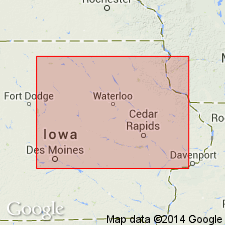
- Usage in publication:
-
- Otis Formation
- Modifications:
-
- Revised
- Overview
- AAPG geologic province:
-
- Iowa shelf
- Wisconsin arch
Summary:
Recognized in east-central IA on the Iowa shelf where it is divisible into the [Coggon] (base) and Cedar Rapids (top) Members. Revised in that it is assigned as the middle formation of the Wapsipinicon Group (rank raised). Unconformably overlies Bertram Formation, basal formation of Wapsipinicon. Upper contact revised in that it underlies Kenwood Member of Pinicon Ridge Formation (new) of Wapsipinicon. Consists of medium- to thick-bedded dolomite in lower part [Coggon] and thin- to medium-bedded limestone and dolomite in upper part (Cedar Rapids). [Coggon] Member has scattered molds of brachiopod EMANUELLA, rare specimens of gastropods, rostroconchs, and trilobites and, at one locality, the conodont OZARKODINA RAASCHI. Cedar Rapids has rare gastropods and bryozoans, pelletal limestones with spirorbids, laminated carbonates with birdseye and mudcracks. Otis is limited to east-central IA (Iowa shelf) and northwest IL (Wisconsin arch). Is a restricted marine deposit. Nomenclature charts. Graphic sections. Of early Middle Devonian, Eifelian age.
Source: GNU records (USGS DDS-6; Denver GNULEX).
For more information, please contact Nancy Stamm, Geologic Names Committee Secretary.
Asterisk (*) indicates published by U.S. Geological Survey authors.
"No current usage" (†) implies that a name has been abandoned or has fallen into disuse. Former usage and, if known, replacement name given in parentheses ( ).
Slash (/) indicates name conflicts with nomenclatural guidelines (CSN, 1933; ACSN, 1961, 1970; NACSN, 1983, 2005, 2021). May be explained within brackets ([ ]).

